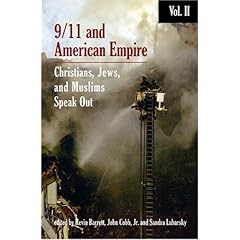
Following hot on the heels of
9/11 and American Empire Vol. I: Intellectuals Speak Out comes
Vol. II: Christians, Jews and Muslims Speak Out.
Co-edited by
Kevin Barrett,
John B. Cobb Jr., and
Sandra Lubarsky, Vol. II succeeds on several levels.
First, the quality of writing and serious contemplative nature of each essay builds on what has been an
amazing year for
written output about 9/11. Second, apart from Griffin's volume,
Christian Faith and the Truth Behind 9/11, Vol. II sets a standard for frank discussion of morality in the shadow of the US hegemon (in the wake of 9/11). Third, for someone who is devoutly or moderately religious, but has not examined the events of 9/11 in a critical light, Vol. II packs a powerful punch. Informed by Griffin's informative rundown of False Flag terrorism, and Nafeez Ahmed's thoroughly documented reinterpretation of "international terrorism", one cannot walk away from this book without being a little bit wiser about the Machiavellian nature of the War on Terror and the historical roots of
state-sponsored terrorism.With Barrett's name on the lips of Wisconsin politicians and attack dogs on FOX News, his notoriety is assured. Cobb is known and respected as a pioneer in the fusion of Process Thought and Christianity. Lubarsky seems to have come on board with the other two editors via her association with David Ray Griffin; she co-edited a volume with him called
Jewish Theology and Process Thought. Griffin is also a Process Theologian, so we can say that
Alfred North Whitehead is well represented here.
Other notable authors also contribute to Vol. II, not least the rabbi
Michael Lerner, whose short piece reveals his willingness to contemplate the worst about 9/11, and also reveals his prior experience with infiltration of a political organization by agents of the state. Sage advice for the naive.
Vol. II makes for an interesting primer to all three religions, with discussion inspired by the notion that 9/11 was a catalyst for geopolitical maneuvering that most Americans would not support without such a catalyst. It turns out that there is a lot of common ground for people of faith to stand on, to examine their priorities and formulate a response to 9/11 that is not afraid to stand apart from the Imperial ambitions of a "New Rome".
Much of the value of the book can only be transmitted by a first-hand reading. The subjective nature of the 9/11 experience informed by each author's religious worldview is a welcome addition to the growing library of 9/11 skepticism.
More on the authors is posted at the MUJCA website:
http://mujca.com/newbook.htm